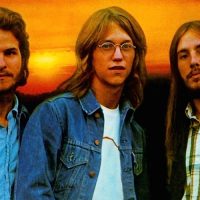I remember once or twice seeing the seventies folk-rock band America on one or two lists of most despised bands, and that always puzzled me. So what if the music is soft, my way of thinking goes, if the vocals are rich, the melodies robust and the production is clean?
The Beauty Room is not quite an America clone (heck, they aren’t even American, they’re British) but if they were wider known, they might get put on a few haters’ list for the same dubious reason. Which brings us to why we’re bringing them up, now.
The Beauty Room is like Steely Dan—not just in that they both blend pop-rock and jazz—but also because they’re really two guys supported by a cast of capable satellite musicians. Kirk Degiorgio is better known in the UK as the solo permanent member of the British techno underground outfit, As One, and also has established a reputation as a producer of note. Jinadu, a disinctive singer capable of wide range but always rendering it in sweetly soulful spoonfuls, never engaging in needless histrionics.
The collaboration between the two began when Jinadu provided some guest lead vocals on As One’s 21st Century Soul (2001) and Out of the Darkness (2004). But when they got together to produce was to be a one-off single cover Jan Hammer’s old tune “Don’t You Know” in 2005, a songwriting chemistry between the two blossomed. An initial batch of four songs was strong enough to encourage the two to push on through to finish out an album’s worth of tunes, and they trekked to down Abbey Road Studio’s famed Studio Two to complete a record, the self-titled The Beauty Room, which they released in 2006.
The Beauty Room, in my mind, doesn’t reveal a dominant member between this duo, it’s truly the work of two individuals who bring their main strengths to the table and use it to elevate the entity: Jinadu with his ability for hooks, lyrics and those pleasing set of pipes; Degiorgio with a penchant to applying unusual chord progressions and voicings to ordinary pop formats (OK, so there’s another similarity to Steely Dan). He also submerged his techno-dance reputation to bring out an affinity for early seventies production values. That production is robust without being overbearing. Yes, they are tracks with synths and string arrangements but they serve accentuating roles, not primary ones. In every single song, it’s the multi-layered vocals that drive the melody.
Now you see where the America (the band) reference comes in; other touchstones in their sound could include Donnie Hathaway, Crosby, Stills and Nash, Joni Mitchell…even the Beach Boys. The freshness in which these songs are delivered and the lacking of overt references serve to prevent this record from getting bogged down in some dead-end nostalgia trip. It’s a soft-edged effort that keeps the listener’s attention with smart, mature songwriting and flawless delivery.
And, it’s richly melodic; no more so than the transcendent first track, “Soul Horizon” (see video below). With instrumentation courtesy of Ian O’Brien’s acoustic guitars and Degiorgio’s gently gurgling electronics, Jinadu’s dreamlike choir of harmonies drive a set of mystical lyrics of love. It’s like some lost CSN nugget.
“Holding On” is a soul poem that get a lift from a swelling chorus and a string arrangement by none other than Eumir Deodato (Frank Sinatra, Bjork, Kool and the Gang). “Burn My Bridges” is the most uptempo song here, underpinned effectively by Thomas O’Grady’s shimmering electric piano and Chris Whitten’s sprightly drums.
The 21st century touches are subtle but they’re there. Jinadu’s voice is apparently auto-tuned on “Visions Of Joy,” but that’s not a criticism in this case; the sterile, ambient soundscape that Degiorgio was going after is hypnotic and Jinadu’s harmonies blended in so thoroughly with the vintage syths is compelling. “Fortress” might be better compared to Coldplay or Blackfield than any of the seventies acts, but the overall vibe of this collection stays on course.
Elsewhere, Jinadu slides easily from falsetto to the low end of his range and back again on “The Weight Of The World,” while “The Moment” has a warm, jazzy vibe. Both are bolstered with some tastefully applied string arrangements. Degiorgio takes a vocal turn on the piano ballad “Shades Of Yesterday,” and even while he can’t hit the notes as effortlessly as Jinadu, he chose a song that fits his plaintive vocal style well.
“Those Days” ends the album just as it began, with lightly-accompanied folk-soul headlined by Jinadu’s sumptuous harmonies.
The long-overdue follow-up is now said to be scheduled for release in September, 2012. Until then, the debut will continue to function just fine as one of the best chill-out groove records to come out in within the pop realm in a long while.
Visit The Beauty Room on Facebook.
- Ches Smith Quartet – ‘Clone Row’ (2025) - May 30, 2025
- James Brandon Lewis Quartet – ‘Abstraction Is Deliverance’ (2025) - May 27, 2025
- Soft Machine – ‘Drop’ (1971, 2025 remaster) - May 21, 2025





